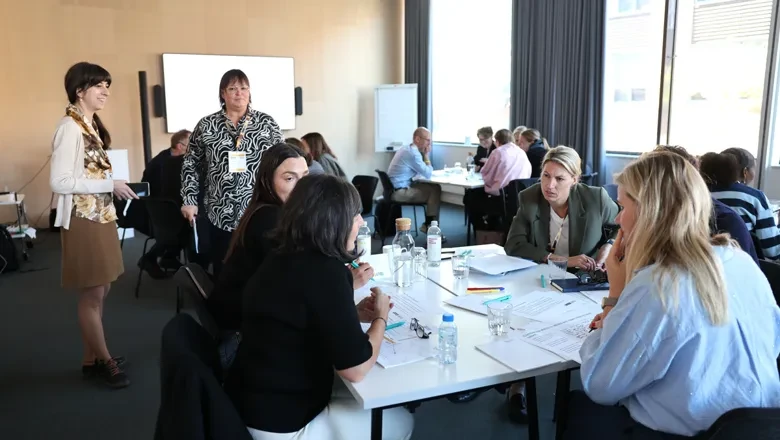Together for future talent attraction – European cities met in Linköping

How can European cities become better at attracting and retaining international talent? That was the central question when Linköping hosted the Eurocities Innovation & Entrepreneurship cooperation forum on 25–26 September.
- Meeting people from across Europe always brings new perspectives and insights. In a Swedish context, Linköping is considered a large city – but in a European context, we are a small city in northern Europe. We have a lot to learn from others,” says Malin Ljung, Director of Business & Economic Development in Linköping Municipality.
Under the theme of international talent attraction, participants from numerous European cities – all members of the Eurocities Economic Development Forum – came together to share experiences, explore common solutions, and gain inspiration from best practices.
The choice of Linköping as host city was no coincidence. Since being named Europe’s most innovative city in the 2023 iCapital Awards, Linköping has gained international attention and has taken a more active role in the Eurocities working group Innovation & Entrepreneurship.
- Being asked to host this forum is proof that Linköping is both visible and influential in Europe. We are seen as a role model, a city others want to visit and learn from,” says Malin Ljung.
Long-term recruitment strategies
The event opened with Anna Broeders, Talent Manager at Linköping Science Park, who presented the project Switch to Sweden, which includes among other things an AI-driven platform that connects international talents with Swedish employers. The platform also offers networking opportunities, seminars, and knowledge resources for both talents and companies.
Sandra Slotte, from Finland, is an internationalisation expert and doctoral candidate with extensive experience in global talent mobility. She spoke, among other things, about Finland’s Talent Boost programme and how they work to connect students, employers, and cities.
Both Anna and Sandra emphasized the importance of collaboration with public actors, as well as companies taking responsibility for long-term talent retention, something Malin Ljung fully agrees with:
- We all need to attract new skills, but the key is not just to bring people here, it’s to make them want to stay. In this case, we’re talking about international competence. Attraction can be about place, but retention is about people, she says.
Facing future challenges together
Participants also discussed local successes and challenges. A common theme was that cities often face similar issues when it comes to attracting and retaining international talent. However, there is also a strong willingness to work together and find collaborative solutions.
The importance of a holistic view on recruitment was highlighted, including making it easier for newcomers to integrate into society, reducing language barriers, and also considering the needs of partners and families.
- I'm here to network and lay the groundwork for future collaborations. Linköping is very similar to my city: a university city with a strong focus on technology. We have a lot to learn from each other,” says Teemu Haapalehto, Director of Economic Development in Espoo, Finland.
The City of Espoo co-hosted the event alongside Linköping and Eurocities. On Friday, Astrid Puumala-Thévenet, Development Manager (integration & migration), City of Espoo , presented the city’s work with highly educated migrants, a group with enormous potential, yet often overlooked. She also stressed the importance of building long-term relationships, both between cities and with EU institutions.
“A dialogue has already started”
In addition to discussions and presentations, participants were also invited to two study visits: an innovation-themed bus tour, and a visit to the newly built Squareshare co-living concept in Ebbepark, designed for companies featuring private rooms and shared spaces.
The two days were filled with energy, motivation, and engaging panel discussions, a good ground for future collaboration between the cities.
- I hope these days lead to concrete cooperation through joint projects with other cities – a dialogue that has already started," concludes Malin Ljung.
FACTS: What is Eurocities?
- Eurocities is a network where representatives from cities across Europe meet, exchange ideas, and collaborate to drive positive change across nine focus areas: governance, climate and environment, digital transformation, culture, food, mobility, migration, social affairs, and economic development.
- While the EU usually works on a national level, Eurocities brings the local perspective to the table, giving cities a voice in Europe.
- The network includes over 200 member cities in more than 38 countries, representing more than 150 million people, both within and beyond the EU.
- Eurocities has seven thematic forums in which member cities can participate. Linköping is currently active in two: Economic Development and Digital Transformation.
Text: Lhina Hansson
Photo: Victoria Krait
